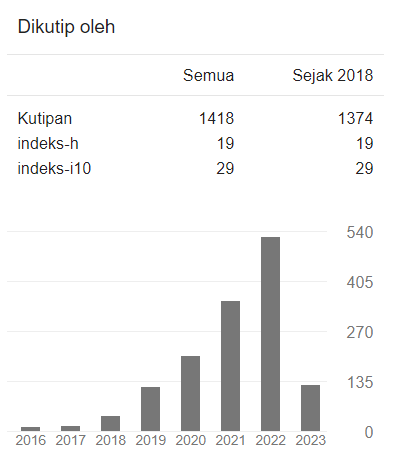KONTRIBUSI INTERIOR KELAS DAN MOTIVASI BELAJAR TERHADAP HASIL BELAJAR PPKN
DOI:
https://doi.org/10.22219/jp2sd.v7i2.9202Keywords:
Class Interior, Learning Outcomes, MotivationAbstract
Regular class design make students uncomfortable and uninterested in learning. The purpose of this study was to examine the contribution of the interior of classroom and learning motivation on learning outcomes PPKn. This study used correlational study. Technique sampling using simple random sampling. The technique of collecting data using questionnaires, documentation, observation, and interviews. Test instrument through validity and reliability test. The data analysis technique used is the prerequisite test data analysis, descriptive statistical analysis, correlation analysis, and regression analysis. The results showed that there was a positive and significant correlation between class interior and learning motivation towards learning outcomes PPKN with a very strong category and contributes quite high which means that the interior of classroom and learning motivation plays a role in improving student learning outcomes, especially in PPKn lesson. The final conclusion is that the interior of classroom and learning motivation contribute to the learning outcomes PPKn Force Elementary School third grade Draupadi Gunungpati District of SemarangDownloads
References
Astuti, Wiwin Wiji, dkk. 2012. Pengaruh Motivasi Belajar Dan Metode Pembelajaran terhadap Hasil Belajar IPS Terpadu Kelas VIII SMP PGRI 16 Brangsong Kabupaten Kendal. Economic Education Analysis Journal, 1(2): 1.
Bakar, Ramli 2014. The Effect of Learning Motivation on Student’s Productive Competencies in Vocational High School, West Sumatra. International Journal of Asian Social Science, 4(6):723.
Demirdag, Prof. Dr. Seyitnan. 2015. Self-Assessmen of Middle School Teachers: Classroom Management and Dicipline Referrals. International Journal on New Trends in Education. Volume: 6 issue: 2.
Djabidi, F. 2016. Manajemen Pengelolaan Kelas. Malang: Madani
Hamdu, Ghullam, dan Lisa Agustina. 2011. Pengaruh Motivasi Belajar Siswa terhadap Prestasi Belajar IPA di Sekolah Dasar. Jurnal Penelitian Pendidikan, 12(1):90
K. Daqrouq. 2018. The Learning Motivating Strategy for Engineering Education. Journal of Applied Science and Technology. 32(1):1-10,2019: Article no. CJAST 440402.
Mappease, Muh. Yusuf. 2009. Pengaruh Cara dan Motivasi Belajar terhadap Hasil Belajar Programmable Logic Controller (PLC) Siswa Kelas III Jurusan Listrik SMK Negeri 5 Makassar. Jurnal Media dan Teknologi 1(2):2.
Nursamiaji, Agung. 2015. Hubungan Motivasi Belajar Dengan Prestasi Akademik Mahasiswa Bimbingan Dan Konseling 2013.Semarang: Universitas Negeri Semarang.
Park Hyungsung .2012. Relationship between Motivation and Student’s Activity. Educational Game. International Jurnal of Grid Distributed Computing. 5(1): 23
Rahmawati, Itsna. 2018. Hubungan Disiplin Belajar dan Motivasi Belajar Dengan Hasil Belajar PPKn. Joyful Learning Journal. 7(3)
Rizal. 2015. Hubungan Keterampilan Guru dalam Mengelola Kelas dengan Motivasi dan Kenyamanan Belajar Siswa di SMK Negeri 1 Garut. Garut: Universitas Pendidikan Indonesia.
Sugiyono. 2015. Statistika untuk Penelitian. Bandung: Alfabeta.
Sunarto. 2015. Pendidikan Kewarganegaraan di Perguruan Tinggi. Semarang: Pusat Pengembangan MKU/MKDK-LP3 Universitas Negeri Semarang.
Susanto, A. 2012. Teori Belajar dan Pembelajaran di Sekolah Dasar. Jakarta: Prenadamedia Group.
Tantri ,A. dan Wenny,A. 2018. Desain Interior untuk Menunjang Pembelajaran Interaktif dengan Nuansa Islam Studi Kasus MI AL-Huda. Jurnal Sains dan Seni ITS, 7(1) 2337-3520.
Tanzil, Silviana Sampurna dan Indrani, Hedy C. 2013. Perencanaan Interior Sekolah Dasar Montessori di Surabaya. Surabaya: Universitas Kristen Petra (diunduh 15 Desember 2018)
Undang-undang Republik Indonesia Nomor 20 Tahun 2003 Tentang Sistem Pendidikan Nasional. Jakarta: Depdiknas.
Undang-undang Republik Indonesia Nomor 20 Tahun 2003 Tentang Sistem Pendidikan Nasional. Jakarta: Depdiknas.
Wahdaniah.dkk. 2017. Pengaruh Efikasi Diri, Harga Diri dan Motivasi Terhadap Hasil Belajar Matematika Peserta Didik Kelas X SMAN 1 Bulupodo Kabupaten Sinjai. Jurnal Matematika dan Pembelajaran, 5(1): 2581-172x.
Widiastuti ,M.A. 2018. Evaluasi Penataan Interior Kelas dalam Pembentukan Perilaku Anak di KBTK Islam Sakha Sidoarjo. Indonesian Journal of Architecture, 4(1) 2460-7878
Widoyoko, Eko Putro. 2016. Evaluasi Program Pembelajaran. Yogyakarta: Pustaka Pelajar.
Downloads
Published
Issue
Section
License
Authors who publish with Jurnal Pemikiran dan Pengembangan Sekolah Dasar (JP2SD) agree to the following terms:
- For all articles published in Jurnal Pemikiran dan Pengembangan Sekolah Dasar (JP2SD), copyright is retained by the authors. Authors give permission to the publisher to announce the work with conditions. When the manuscript is accepted for publication, the authors agree to automatic transfer of the publishing right to the publisher.
- Authors retain copyright and grant the journal right of first publication with the work simultaneously licensed under a Creative Commons Attribution-ShareAlike 4.0 International License that allows others to share the work with an acknowledgment of the work's authorship and initial publication in this journal.
- Authors are able to enter into separate, additional contractual arrangements for the non-exclusive distribution of the journal's published version of the work (e.g., post it to an institutional repository or publish it in a book), with an acknowledgment of its initial publication in this journal.
- Authors are permitted and encouraged to post their work online (e.g., in institutional repositories or on their website) prior to and during the submission process, as it can lead to productive exchanges, as well as earlier and greater citation of published work (See The Effect of Open Access).

This work is licensed under a Creative Commons Attribution-ShareAlike 4.0 International License.


















